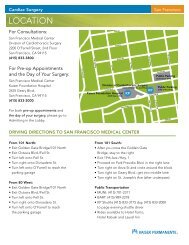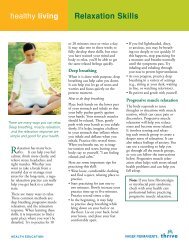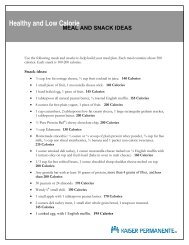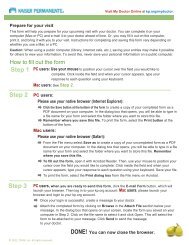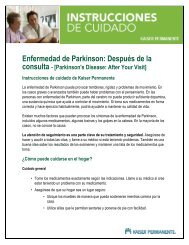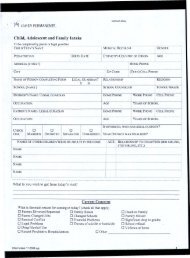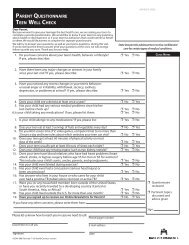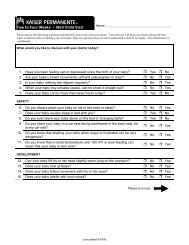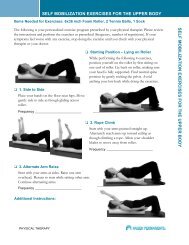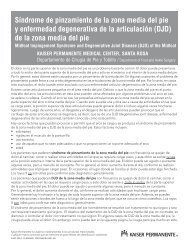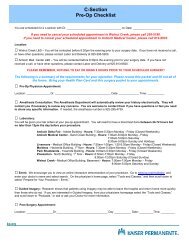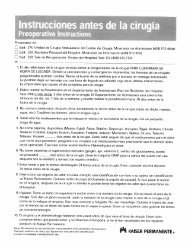Depression and Seniors - My Doctor Online The Permanente ...
Depression and Seniors - My Doctor Online The Permanente ...
Depression and Seniors - My Doctor Online The Permanente ...
Create successful ePaper yourself
Turn your PDF publications into a flip-book with our unique Google optimized e-Paper software.
healthy living <strong>Depression</strong> <strong>and</strong> <strong>Seniors</strong><br />
Even the most serious<br />
depression usually<br />
responds to the right<br />
treatment.<br />
Are you a senior who feels<br />
down or empty? Do you<br />
have trouble sleeping or eating?<br />
Are you bothered by aches <strong>and</strong><br />
pains that don’t go away?<br />
Perhaps you care for an older<br />
person who feels this way. If you<br />
or someone you care for is<br />
depressed, we can help.<br />
<strong>Depression</strong> is a real disease, just<br />
like heart disease or diabetes. It<br />
can affect your mind, body, <strong>and</strong><br />
moods. It can change the way<br />
you think <strong>and</strong> feel. <strong>Depression</strong><br />
is more than just a blue mood.<br />
It is a serious disorder that affects<br />
your daily life.<br />
REGIONAL HEALTH EDUCATION<br />
<strong>The</strong> good news is that nearly 80<br />
percent of people who have<br />
symptoms of depression can<br />
improve with treatment.<br />
Treatment may include classes,<br />
medications, psychotherapy, or a<br />
combination of these. Even the<br />
most serious depression usually<br />
responds to the right treatment.<br />
Common myths<br />
<strong>My</strong>th #1: Feeling “down in the<br />
dumps” is a normal part of<br />
growing older.<br />
Fact: Feelings of sadness are<br />
normal for anyone, but long<br />
periods of depression (for more<br />
than 2 weeks) are not a normal<br />
part of aging. If you are sad <strong>and</strong><br />
have no interest in things you<br />
used to enjoy, you may be<br />
depressed.<br />
<strong>My</strong>th #2: <strong>Depression</strong> is harder to<br />
treat in seniors.<br />
Fact: With treatment, even the<br />
most seriously depressed person<br />
– no matter what their age – can<br />
start to feel better <strong>and</strong> get back<br />
to a happier life. <strong>The</strong> first step is<br />
to realize that you need help,<br />
<strong>and</strong> then to ask for it. If you feel<br />
isolated, ask a friend or relative<br />
to help you make or keep an<br />
appointment with a health care<br />
professional. That way, you can<br />
get the help that you need.<br />
<strong>My</strong>th #3: <strong>Depression</strong> is related to<br />
dementia or Alzheimer’s disease.<br />
Fact: <strong>Depression</strong> symptoms can<br />
be the same as with these<br />
conditions. However, depression<br />
is not the same illness. It is a<br />
separate medical condition that<br />
requires different treatment. To<br />
make a correct diagnosis, a<br />
health care professional will do a<br />
thorough evaluation.<br />
Diagnosing depression in<br />
seniors<br />
<strong>Depression</strong> in seniors is sometimes<br />
missed or left untreated. As a<br />
person ages, others may see the<br />
signs of depression as<br />
grumpiness or irritability.<br />
<strong>Depression</strong> can cause confusion<br />
or memory problems that<br />
sometimes look like Alzheimer’s<br />
disease or other brain disorders.<br />
Even some medications used for<br />
high blood pressure or heart<br />
disease can cause mood changes<br />
<strong>and</strong> signs of depression.<br />
<strong>Depression</strong> is common in people<br />
who have other chronic diseases.<br />
Being depressed can make these<br />
diseases worse.<br />
People with depression may not<br />
take their medications for their<br />
chronic diseases. However, they<br />
can get treatment for depression<br />
<strong>and</strong> get back on track.
healthy living <strong>Depression</strong> <strong>and</strong> <strong>Seniors</strong><br />
Signs <strong>and</strong> symptoms<br />
If you have 5 or more of the<br />
following symptoms that last for<br />
more than 2 weeks, call Kaiser<br />
<strong>Permanente</strong>:<br />
• Feeling “empty” or sad<br />
• Giving up activities that you<br />
used to enjoy<br />
• Sleeping too much or too little<br />
• Eating more or less than usual<br />
• Crying a lot<br />
• Problems concentrating,<br />
remembering, or making<br />
decisions<br />
• Feeling irritable or restless<br />
• Feeling guilty, helpless, or<br />
worthless<br />
• Having thoughts of death or<br />
suicide<br />
Causes of depression<br />
Many things cause depression.<br />
Some contributing factors,<br />
especially among seniors, are:<br />
• Other illnesses or disabilities<br />
• Medications for heart problems<br />
<strong>and</strong> chronic pain<br />
• Personal or family history of<br />
depression<br />
• Major life events (loss of a<br />
loved one, divorce or other<br />
marital difficulties, retirement)<br />
• Alcohol or drug abuse<br />
Whatever the cause, depression<br />
needs to be diagnosed <strong>and</strong><br />
treated.<br />
Asking for help is the<br />
first step to feeling better<br />
Many people feel uncomfortable<br />
with the subject of depression.<br />
Some people feel that asking for<br />
help is a sign of weakness, or<br />
that a depressed person should<br />
be able to just “snap out of it.”<br />
<strong>The</strong>se ideas are not true.<br />
<strong>Depression</strong> can be serious. If left<br />
untreated, it can cause a lot of<br />
suffering. Talk to your personal<br />
physician or other health care<br />
professional if you think you or<br />
someone you care about is<br />
depressed.<br />
Self-care for depression<br />
• Set a daily schedule for sleeping,<br />
eating, bathing, or other<br />
important activities.<br />
• Do things that you enjoy like<br />
reading, or spending time with<br />
family <strong>and</strong> friends.<br />
• Get moving. Regular exercise<br />
is good for you. Even just a<br />
little, such as 10 to 15 minutes<br />
of walking per day, can help<br />
give you more energy, reduce<br />
stress, <strong>and</strong> improve your mood.<br />
© 2007, <strong>The</strong> <strong>Permanente</strong> Medical Group, Inc. All rights reserved. Regional Health Education.<br />
915800030 (Revised 1-08) RL 8.1<br />
• Avoid alcohol <strong>and</strong> drugs, since<br />
they can make depression<br />
worse <strong>and</strong> interfere with<br />
medications.<br />
• Relax using deep breathing,<br />
soothing music, or meditation.<br />
• Practice making specific<br />
requests. Ask for what you need,<br />
<strong>and</strong> get help.<br />
Additional resources<br />
Web sites<br />
• Visit our Web site at kp.org.<br />
In Northern California, you<br />
can bookmark your<br />
physician’s Home Page at<br />
kp.org/mydoctor<br />
• National Institute of Mental<br />
Health nimh.nih.gov<br />
• For a customized online<br />
stress management plan,<br />
check out our HealthMedia ®<br />
Relax Healthy Lifestyles<br />
program at<br />
kp.org/healthylifestyles.<br />
Books<br />
• Kaiser <strong>Permanente</strong><br />
Healthwise H<strong>and</strong>book<br />
Phone numbers<br />
• Suicide Prevention Hotline<br />
1-800-SUICIDE<br />
(1-800-784-2433)<br />
Contact your Kaiser<br />
<strong>Permanente</strong> Health Education<br />
Center or Department for<br />
books, videos, classes, <strong>and</strong><br />
additional resources.<br />
This information is not intended to diagnose or to take the place of medical advice or care you receive from your physician or other health care professional.<br />
If you have persistent health problems, or if you have additional questions, please consult with your doctor. If you have questions or need more information about<br />
your medication, please speak to your pharmacist. Kaiser <strong>Permanente</strong> does not endorse the medications or products mentioned. Any trade names listed are<br />
for easy identification only.



